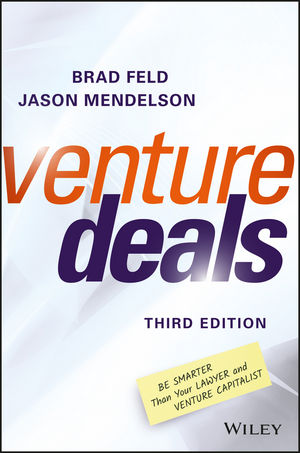So, you’ve got a brilliant idea and you’re ready to launch a company. You’re passionate and ready to act! But first comes the tricky part: securing funds to make your dream a reality. If you’re new to the concept of raising massive amounts of cash for a new business, it’s only natural to be unsure of how to proceed from here.
“Don’t get discouraged,” insist Brad Feld and Jason Mendelson. The managing directors of venture capital firm Foundry Group explain that finding investors for your business is easier than you may think.
“Venture capitalists play a vital role in turning entrepreneurial visions into reality,” says Jason Mendelson, coauthor along with Brad Feld of Venture Deals: Be Smarter Than Your Lawyer and Venture Capitalist, 3rd Edition (Wiley, 2016, ISBN: 978-1-1192597-5-6, $49.95). “The fundraising stage is vital for any entrepreneur, but you can’t wing it through your meetings and expect to be taken seriously. And that means understanding how to appeal to potential investors and being totally prepared.”
The authors explain that as an entrepreneur, your goal when raising financing is to get several term sheets—the documents describing the terms and conditions of financing. While every VC is different, there are a few basics that will help you get the money you need to get your company up and running. Keep reading for Feld and Mendelson’s tips to help you pitch with confidence, impress VCs of all levels, and get the funding you need.
Do or do not—there is no “try.” Start out with an attitude of presuming success or you’ll never make it, instructs Feld. Failure is a key part of entrepreneurship, and every successful entrepreneur must inevitably overcome plenty of setbacks. However, where raising funds is concerned, a confident attitude impacts outcome every time.
“When we meet people who say they are ‘trying to raise money’ or ‘testing the waters,’ it’s not only a turnoff but often shows they’ve not had success,” notes Mendelson. “Investors will smell this uncertainty on you, and it will permeate your words and actions.”
Determine how much you need to raise. “Be careful not to go out asking for an amount that is larger than you need,” warns Feld. “One of the worst positions you can be in during a financing is to have investors interested, but be too far short of your goal.”
For example, assume you are a seed-stage company that needs $500,000 but you go out looking for $1 million. One of the questions that the VCs and angels you meet with will probably ask you is: “How much money do you have committed to the round?” If you answer with, “I have $250,000 committed,” a typical angel may feel you’re never going to get there and will hold back on engaging just based on the status of your financing. However, being able to say, “I’m at $400,000 on a $500,000 raise, and we’ve got room for one or two more investors,” is a powerful statement to a prospective angel investor since most investors love to be part of an oversubscribed round.
Additionally, Feld advises you to be specific in your financial numbers. “We don’t believe in ranges in the fundraising process,” he says. “When someone says they are raising $5 million to $7 million, our first question is ‘Which is it?’ Don’t give the appearance of hedging your bets! We recommend stating that you are raising a specific number. If you end up with more investor demand than you can handle, you can always raise a larger amount of money.”
Come prepared with your fundraising materials. Before you hit the fundraising trail, there are some basic materials you should have ready to share. At minimum, you will need a short description of your business, an executive summary, and a PowerPoint-style presentation. Today most materials are shared over email, so don’t worry about printing out copies. In fact, keep the material clear and concise instead of trying to make it visually appealing. Here’s what you’ll need:
-A short description of your business. You’ll need a few paragraphs that you can email—often called the elevator pitch—meaning you should be able to give it during a brief elevator ride up to your investor’s office.
-An executive summary. This is a one- to three-page description of your idea, product, team, and business. Think of it as the first impression you’ll make on VCs you haven’t yet met, and expect it to be passed around the VC firm if there’s any interest in what you’re doing. In the executive summary, include the problem you are solving and why it’s important to solve. Explain why your product is awesome, why it’s better than what currently exists, and why your team is the right one to pursue it. End with some high-level financial data to show that you have aggressive but sensible expectations about how your business will perform over time.
-The presentation. Once you’ve engaged with a VC firm, you’ll quickly be asked either to give or to email a presentation. This is usually a 10- to 20-page PowerPoint (or Google Docs) presentation consisting of a substantive overview of your business. Work hard on the presentation flow and format. Form matters a great deal here—it’s amazing how much more positive a response is to well-designed and well-organized slides, especially if you have a consumer-facing product where user experience will matter a lot for its success.
-The demo. Most VCs love demos. Mendelson explains that demos help them learn more than they could from any document, especially about their interest in the product. “We believe the demo, a prototype, or an alpha is far more important than a business plan or financial model for the very early-stage company,” Mendelson says. “The demo shows us your vision in a way we can interact with. More important, it shows us that you can build something and then show it off.”
Go the extra mile to be transparent. Further down the financing path, VCs will ask for additional information, known as due diligence materials. If a VC offers you a term sheet, expect their lawyers to ask you for more information like capitalization tables, contracts, material agreements, employment agreements, and board meeting minutes. The authors stress how important it is to provide the most accurate information possible.
“You should never try to hide anything with any of these fundraising materials,” asserts Feld. “Although you are trying to present your company in the best light possible, you want to make sure any issues you have are clearly disclosed. A good VC will respect full disclosure early on, and if they are interested in working with you, will actively engage to help you get through any challenges you have.”
Find the right VC. The best way to find the right VC is to ask your friends and other entrepreneurs, because they can give you unfiltered data about which VCs they’ve enjoyed working with and who have helped build their businesses. But also check out the websites, blogs, and social media posts of multiple VCs to learn what types of companies they invest in, what stage of growth they prefer to invest in, past successes, failures, approaches, and strategies. And it never hurts to engage at a personal level via a social media platform.
“Following a VC on social media can be useful as a starting point to develop a relationship,” says Mendelson. “You can comment thoughtfully on their blog posts, offer suggestions, interact, and follow the best rule of developing relationships: ‘Give more than you get.'”
Once you’ve met with potential VCs, you’ll hopefully meet one interested in being the lead VC. This is the firm that will give you a term sheet, take a leadership role in driving financing, and likely be your most active new investor. Keep your head up and stay optimistic throughout this process. Ideally several VCs will take interest in your company, giving you the negotiation leverage to improve the terms of this deal.
Close the deal. “Closing is the most important part of the fundraising process,” asserts Feld. “It consists of signing the term sheet, then signing the definitive documents, and finally getting the cash.”
Signing the term sheet is vital, as most executed term sheets result in financing that closes. The second part of closing the deal is the process of the definitive agreements. This is usually done by lawyers, who negotiate the 100-plus pages of documentation that are generated from the term sheet. In the best-case scenario, during this process you respond to due diligence requests and the next thing you know, you have money in the bank and a new board member with whom you are excited to work.
“The path of an entrepreneur isn’t always easy, but confidence and total preparedness will help you achieve success in the long run,” concludes Feld. “When your vision is crystal clear and your passion evident, investors will notice and get just as excited about your project as you are. After your hard work finally pays off and you secure financing, you will have a company that you’re proud to call yours.”
# # #
About the Authors:
Brad Feld (brad@foundrygroup.com, @bfeld, www.feld.com) is a cofounder and managing director of Foundry Group (www.foundrygroup.com), a Boulder, Colorado–based venture capital fund. Foundry Group invests in technology companies all over the United States. Prior to cofounding Foundry Group, Brad cofounded Mobius Venture Capital and, prior to that, founded Intensity Ventures, a company that helped launch and operate software companies. Brad is also a cofounder of Techstars and has coauthored several books, including Venture Deals: Be Smarter Than Your Lawyer and Venture Capitalist, Do More Faster, Startup Communities, Startup Life, Startup Boards, and Startup Opportunities.
In addition to his investing efforts, Brad has been active with several nonprofit organizations and currently is chair of the National Center for Women and Information Technology (www.ncwit.org). Brad is a nationally recognized speaker on the topics of venture capital investing and entrepreneurship and writes blogs at www.feld.com, www.venturedeals.com, and www.startuprev.com.
Brad holds bachelor of science and master of science degrees in management science from the Massachusetts Institute of Technology. He is also an avid art collector and long-distance runner. He has completed 24 marathons as part of his mission to run a marathon in each of the 50 states.
Jason Mendelson (jason@foundrygroup.com, @jasonmendelson, www.jasonmendelson.com) has over 20 years of experience in the venture capital and technology industries in a multitude of investing, founding, operational, and engineering roles. Prior to cofounding Foundry Group, Jason was a cofounder of SRS Acquiom, the largest mergers and acquisitions closing platform. SRS has completed over $200 billion in merger transactions as escrow agents, payments administrators, shareholder representatives, and insurers.
Prior to cofounding SRS, Jason was a managing director and general counsel for Mobius Venture Capital, where he also acted as its chief administrative partner, overseeing all operations of the firm. During this time, Jason led fund formation activities and assisted portfolio companies with challenges dealing with high-stakes litigation, securities, employment, regulatory, and intellectual property law.
Prior to his involvement with Mobius Venture Capital, Jason was an attorney with Cooley LLP, where he practiced corporate and securities law with an emphasis on representation of emerging companies in private and public financings, mergers, and acquisitions.
Before his legal career, Jason was a senior consultant and software engineer at Accenture where he focused on financial institution re-engineering engagements. While at Accenture, Jason supervised programming teams of up to 40 people in size and was responsible for managing deliverables in multi-billion-dollar engagements.
As one of the first full-time, in-house general counsels at a venture capital firm, Jason has been on the forefront of thought leadership, has co-chaired the National Venture Capital Association’s (NVCA) General Counsel group, and has been an active participant in the NVCA’s Chief Financial Officer group. He was one of the key draftspersons for the NVCA model document task force that created the industry’s first set of standardized venture capital financing documents, which has greatly aided in the efficiency of completing these types of deals. He served on the board of the NVCA, including as an executive board member, from 2009-2013.
Jason holds a bachelor of arts degree in economics, with distinction, and a juris doctor, cum laude, from the University of Michigan. He is an active musician, playing drums and singing with his band, Legitimate Front, with his partner, Ryan McIntyre, and enjoys home remodeling and travel. He also coauthored the best-selling book Venture Deals: Be Smarter Than Your Lawyer and Venture Capitalist. Jason is also proud to be an adjunct professor at the University of Colorado for the past decade. He serves as the chair of the Entrepreneurial Initiative Advisory Board and as an executive fellow at the Silicon Flatirons Center. You can find him on Twitter: @jasonmendelson.
About the Book:
Venture Deals: Be Smarter Than Your Lawyer and Venture Capitalist, 3rd Edition (Wiley, 2016, ISBN: 978-1-1192597-5-6, $49.95) is available at bookstores nationwide, from major online booksellers, and direct from the publisher by calling 800-225-5945. In Canada, call 800-567-4797. For more information, please visit the book’s page on www.wiley.com.
Find a Home-Based Business to Start-Up >>> Hundreds of Business Listings.

















































